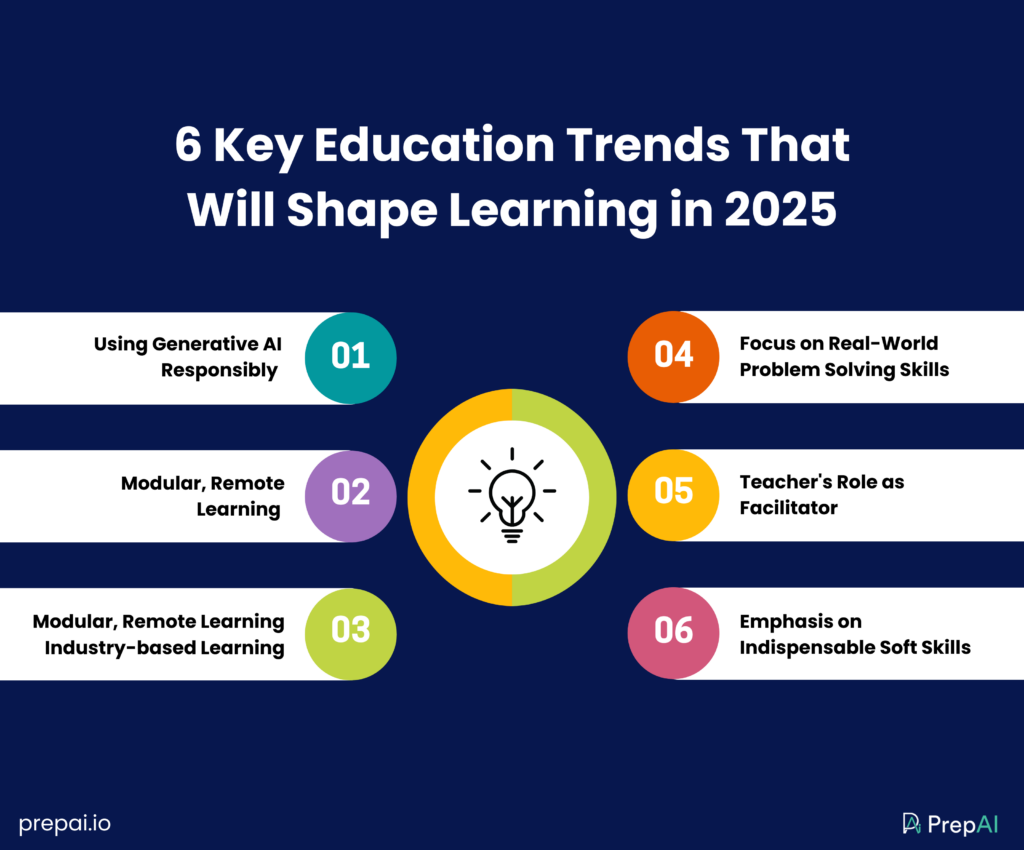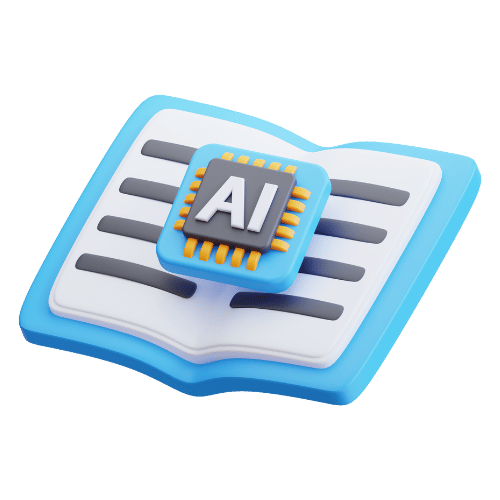Cutting-edge education tools assist educators in enhancing teaching methods and improving student learning outcomes. Let’s explore six key education trends that stand to shape learning and teaching in 2025, with insights on how they can revolutionise productivity like never before.
Learning in the 21st century is not the same as it was in Einstein’s era due to exponential changes in population, industrial expectations, economic needs, and culture. To keep up with modernity, students must update their aims and goals to match an ever-changing society. In this blog, we’ll discuss six education trends that will mark a shift in how people learn in 2025.
Students must become adept at leveraging AI, mastering tools through remote learning, and tackling real-world challenges while developing essential soft skills that set them apart from automated systems. Teachers in the form of facilitators will use technology to personalise education, use quiz generator tools in classrooms and equip learners with not only the technical knowledge required to thrive, but a comprehensive knowledge of the self that will enable them to quickly learn in a manner that suits their style.

1. Using Generative AI Responsibly for Education Trends
While AI has access to vast arrays of information, it is important for researchers to segregate inaccuracies and verify the information presented. The existence of Stockfish did not hinder the flourishing of chess but helped maximise the output of top players. Similarly, leveraging AI to upskill yourself and become indispensable involves learning to differentiate between the various generated outputs. Cultivating irreplaceable skills is key to surviving in a market contested by binary machines.
Students could use AI tools like quiz generators from text to supplement their learning and fill in potential gaps in their education trends, while teachers could simplify and automate rote work like designing question papers, tracking attendance and grading. Having said that, it is important to ethically use AI in a manner that supplements learning and preparation instead of replacing hard work, creativity and student-teacher interaction.
2. Modular, Remote Learning
The events of the Covid-19 pandemic showed us the practicability of working and learning from the comfort of our homes. In an era where information is dense and plentiful, an individual is expected to be a specialist in a field rather than a generalist, like in the 20th century. They would prefer specialised training in a field of their interest to raise their worth in the marketplace. Quickly mastering new tools is of the essence, and learning online, where all the material is readily available, makes the process faster and more efficient than the traditional method of signing up for an offline course.
Online education trends enable learning any skill or hobby with a click of the mouse and remove the time-consuming need for an intermediary between the knowledge and the learner. Remote learning is also inclusive, given information accessed is the same for any and all, irrespective of geographical location or health restrictions, ensuring knowledge is distributed among the masses. Examinations can be held online with AI quiz generators that test the students on the content, unlike large congregations in a common hall.
3. Industry-based Learning
With professional skills becoming key to success in the industry, more businesses will partner up with schools in order to impart practical skills to children in their formative years. Gone are the days when students must laboriously sit through 8 classes for 12 years before working on their respective interests. Industrial exposure from a young age ensures an economically productive generation that is more informed on the technological aspects of the world, ready to learn new skills with ever-changing dynamics, empowered to select appropriate college courses, and ready for meaningful careers in a competitive world.
Partnerships with businesses, NGOs, and government organisations will become integral to a student’s learning. They will work on real-world problems these agencies provide, gaining practical skills and developing professional networks. Ensuring a robust understanding of industry needs from a young age will offset labour shortages and create a more competent workforce.
Consistency is the only key to success in preparation for aptitude tests. Regular practice is directly proportional to progress. You can schedule a specific time every day to take practice tests and review performance. Regular practice not only makes one comfortable with the questions on a technical level, but also develops speed and accuracy, which is non-negotiable in aptitude tests.
4. Focus on Real-World Problem Solving Skills
Project-based and Interdisciplinary learning will be heavily emphasised in 2025, where students will tackle real-world dilemmas, such as designing sustainable solutions or solving local community problems. These projects will enable critical thinking, creativity, and practical application of knowledge as opposed to rote-learning for the majority of the student’s life and application of skills playing only after arbitrary examinations and certificates are procured. In a rapidly growing education trends world, communication between various fields is paramount.
For example, the issue of biodiversity conservation and climate change will include ethical, cultural, and financial considerations alongside scientific conclusions. This makes it important for the next generation of students to not only learn deep, but have enough knowledge across disciplines to arrive at complete solutions for real-world complexities. In order to achieve this goal, memorisation of information will take a back seat, and skills like data analysis and design thinking will take the limelight.
5. Teacher’s Role as Facilitator
The role of teachers in 2025 will revolve around being facilitators — emphasising personalised guidance and empowering students rather than solely lecturing and grading papers. This is a direct result of the advancements in technology, changes in societal and industrial needs, and the evolving capabilities of students in a rapidly changing world. A teacher might identify a student struggling with geometry and recommend interactive simulations using digital tools to deliver the same. Identifying the strengths and weaknesses and adapting to each student’s needs.
The rise in AI led to a noticeable change in the technology education trends used in the field of education. Teachers can use artificial intelligence to automate laborious tasks like analysing a student’s performance over the years, identifying areas of improvement, collecting attendance statistics, and creating test papers. Question generation from text helps the teacher covers vast swaths of syllabus by uploading a document and having the software come up with pertinent questions based on the assessment type, requirements and other parameters Tools like PrepAI assists the teachers in generating questions of various formats, testing the student on multiple fronts enabling the teacher to have a student-centric approach to education.
6. Emphasis on Indispensable Soft Skills
As automation and AI take over linear and information-driven tasks, the demand for uniquely human skills will soar. Soft skills are essential for roles that require creativity, emotional intelligence, and the ability to navigate complex interpersonal and organisational dynamics. Machines can crunch numbers with precision and effectiveness, but humans excel at analysing context in complicated cases, making judgments in ambiguous situations and generating novelty.
AI will simply be a tool in the long-term plan that can only be created by a highly specialised human. Emotional intelligence and the ability to understand a situation beyond the linear processes of an algorithm are key to lead and co-exist in diverse teams as companies and NGOs become increasingly globalised. Quiz generator tools like PrepAI can be used to assess emotional intelligence and higher-order thinking skills in students.
Conclusion
The educational sector in 2025 will be greatly different from what exists and will be driven by improvements in technology and a rapidly evolving global workforce. To thrive in this dynamic environment, education must go beyond memorisation and generalised knowledge to embrace a holistic approach that integrates specialisation, practical experience, cross-disciplinary problem-solving, and empathy.
The education trends that shape education in 2025 will aim to prepare the learners to not learn for contemporary careers but also to face the challenges of an interconnected, rapidly changing world. By focusing on abilities that generate novelty, education will empower the next generation to lead and innovate in the age of AI.



